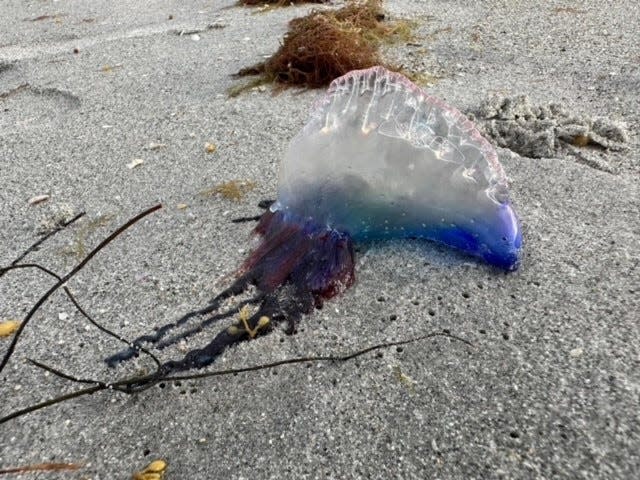Two jellyfish-like creatures washed ashore in Sunset Beach this week. Here's what to know.

Two dangerous sea creatures washed ashore on Sunset Beach this week and officials are urging the public to stay alert.
According to the Sunset Beach Fire Department, two Portuguese man o' wars were discovered on the beach's shoreline on Tuesday, June 27.
Here's what we know about the creatures and what to do if you encounter one.
What is a Portuguese man o' war?
According to the National Ocean Service, a Portuguese man o' war is closely related to a jellyfish, but is not one. The Portuguese man o' war is a species of siphonophore, animals that are comprised of a colony of specialized clones all working together as one.
The species are part of a group of animals that includes the corals, hydroids and true jellyfish.
The man o’ war is recognized by its balloon-like, colorful float, which rises up to six inches above water. Below the surface are the man o' war's long tentacles that could measure between 30 and 100 feet, according to the National Ocean Service.
More: Sharks are gathering off the NC coast. Here's why and how you can avoid them.
Where are they typically found?
The Portuguese man o' war is typically found in tropical and subtropical seas, according to the National Ocean Service. The marine creatures float, propelled by wind and ocean currents, sometimes in groups of 1,000 or more.
Are they deadly to humans?
The man o' war's tentacles contain stinging power and "venom capable of paralyzing and killing small fish and crustaceans," the National Ocean Service says.
However, a man o' war's sting is rarely deadly to humans. Still, the sting can be extremely painful and cause welts on exposed skin.
What should you do if you see one?
Stay away. According to the National Ocean Service, the man o' war is capable of stinging even weeks after it's washed ashore.
The Sunset Beach Fire Department urged community members who see these creatures on shore to contact beach patrol to request removal.
STAY CONNECTED: Keep up with the area’s latest Brunswick County news by signing up for the Brunswick Today newsletter and following us on Facebook and Instagram.
Jamey Cross covers Brunswick County for the StarNews. Reach her at jbcross@gannett.com or message her on Twitter @jameybcross.
This article originally appeared on Wilmington StarNews: Portuguese men o' war discovered in Sunset Beach, here's what to know

